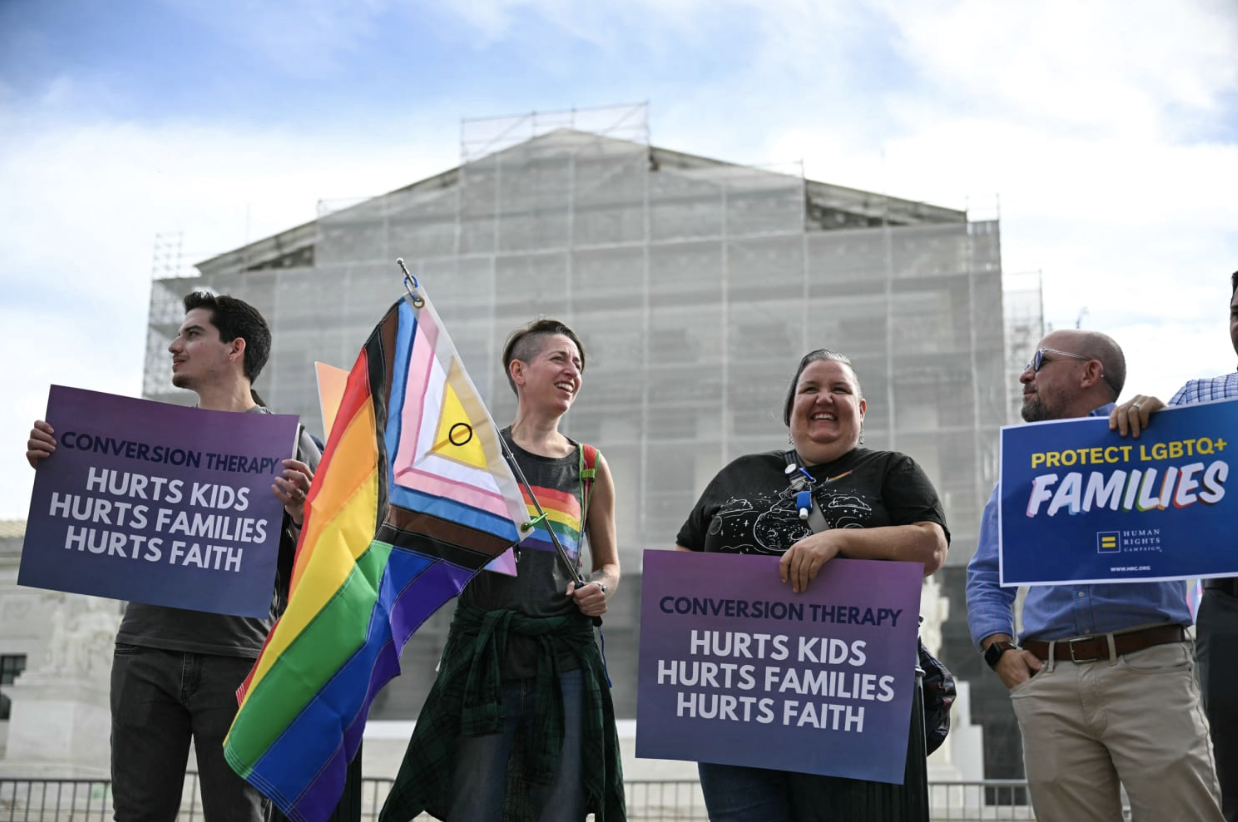Photo via San Francisco Chronicle
***
On October 7th, 2025, the Supreme Court appeared ready to strike down a 2019 Colorado law that bars licensed therapists from providing talk therapy that seeks to change a client’s gender identity or sexual orientation. In the United States, over twenty-four other states outlaw conversion therapy since major medical groups like the American Medical Association and the American Psychological Association have condemned the practice as ineffective and potentially harmful for minors.
A majority of the Supreme Court Justices interpreted Chiles v. Salazar as a clear case of viewpoint discrimination, since licensed therapists can only respond to issues related to gender and sexuality from one perspective. Conservative Justice Samuel Alito, for instance, asserted that the Colorado law “looks like blatant viewpoint discrimination.”
The plaintiff in the case, Kaley Chiles, is a licensed mental health counselor in Colorado who, as a Christian, believes “people flourish when they live consistently with God’s design.” Because Colorado state law prohibits Chiles from counseling clients to change their sexual orientation or gender identity to the traditional biblical understanding, she has interpreted the statute as a violation of her First Amendment right to free speech.
The state of Colorado, represented by State Solicitor General Shannon Stevenson, however, asserted that such speech is banned from Chiles’ professional conduct as a licensed counselor, as it constitutes an attempt to change a minor patient’s identity. Noting the detrimental effects of conversion therapy, Colorado also highlights the widely accredited claim that it puts minors at increased risk of anxiety, depression, and suicide.
Colorado’s ban on conversion therapy passed in 2019, after victims like Mathew Shurka testified about the trauma he faced from attending five years of the treatment. Shurka was advised to limit contact with his mother and sisters for three years, in an attempt to prevent him from seeing women as his peers. In a statement on his experience, Shurka held, “I knew I wasn’t changing and I blamed myself for my failures; it didn’t occur to me that the therapist was hurting me.”
Nevertheless, within the circumstances of the case, the key question is whether the law regulates conduct related to professional-provided healthcare or protected speech. While the free speech clause generally prohibits viewpoint discrimination, the government may differentiate between viewpoints in limited circumstances. The government may do so when it itself is a speaker or a compelling government interest is apparent within its action.
To the state of Colorado, the law intends to regulate medical practices and protect patients from substandard care. Colorado’s Attorney General, Phil Weiser, argued that a Supreme Court ruling against the state would undercut the ability of states to regulate other professions.
Chiles’ lawyers from Alliance Defending Freedom, a conservative Christian legal organization, asserted that her practice of conversion therapy does not constitute conduct, since it involves no physical restraints or coercion of any kind. Lawyer James Campbell insisted that her practice involves only talk therapy and, consequently, Chiles is being silenced. Campbell stated, “Ms. Chiles is being silenced. The kids and families who want help, this kind of help that she offers, are being left without any support.”
Interpreting the two arguments, liberal Justice Ketanji Brown Jackson questioned the difference between the actions of medical doctors providing medication and those providing talk therapy. Outlining her perception, Justice Jackson stated, “It’s just very puzzling to me that she [Chiles] would stand in a different position than a medical professional who has exactly the same goals and would just be prescribing medication.”
The U.S. Court of Appeals for the 10th Circuit ruled similarly to Justice Brown’s perspective, concluding that the Chiles’s argument asserts “that mental health care is not really health care and that talk therapy is not really medical treatment.” However, according to Chiles and the dissenting opinion of the lower court, the scientific research behind the Colorado statute is not strong.
Rejecting Colorado’s argument that a compelling government interest arises from the current medical consensus on conversion therapy, Justice Alito and Justice Neil Gorsuch note instances where scientific consensus has been wrong and upended. Justice Alito, for example, mentions Buck v. Bell, the 1927 Supreme Court case that upheld a Virginia law permitting the forced sterilization of individuals deemed socially inadequate by things like low IQ scores. Claiming that the medical consensus was “politicized” and “taken over by ideology,” Justice Alito questions the validity of scientific research and seemingly rejects the sentiment that the government must protect LGBTQ+ youth from conversion therapy.
Ultimately, the Supreme Court appears highly skeptical of the value of state bans on conversion therapy practiced by licensed mental health professionals. Based on oral arguments, it seems that the future ruling on the case will deem restrictions on the speech of licensed therapists unconstitutional. In such a ruling, the Court will expand its narrow view on necessary state action regarding the support of LGBTQ+ individuals’ personal rights like medical treatment, access to healthcare, and protection from substandard care.
***
This article was edited by Jorja Mulvihill and Griffen Strauss.
